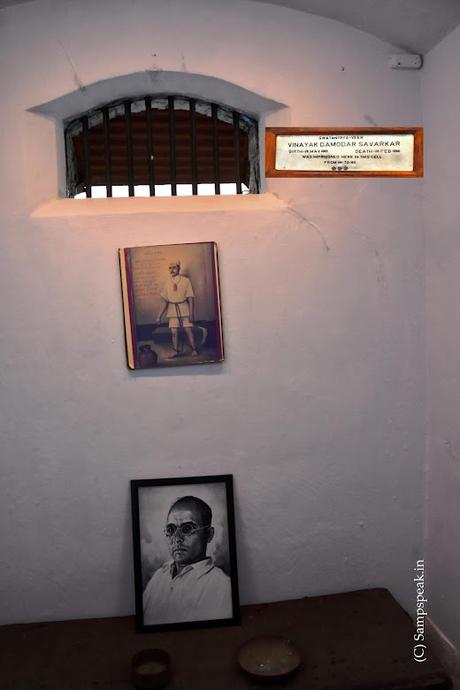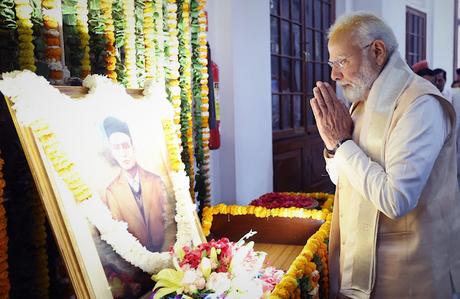This film was released in 1996 and when I saw it on First day of its release in Kakinada, the theater was not exactly crowded. It was a film set in British India in the year 1915. The story is about a young doctor, Govardhan Menon (Mohanlal), wrongly accused of bombing a train carrying 55 people including British officials. He is sentenced to serve punishment in cellular jail at Port Blair, Andaman and Nicobar Islands. The film moved me – I was choked with emotions and tears.
 the tiny cell room where Veer Savarkar was cruelly confined for 10+ years !
the tiny cell room where Veer Savarkar was cruelly confined for 10+ years !
More than a century and decade back, (on 8th July 1910) a British ship docked in the French port of Marseille. A fugitive from the ship jumped into the water and swam to the French dock. British took custody of him. It caused International furore and was reported to International Court of Justice – Arbitration between two Nations – Great Britain and France; the hotly debated issue being that of Sovereignty of the State.
Another case, another time, of what we did not study in school books of Indian History .. .. a case between Britain and France – the man – Vinayak Damodhar Savarkar aka Veer Savarkar.
As described in Court papers, this case arose as the result of the escape of Savarkar, a Hindoo, who was being transported from England to India for trial on a charge of abetment of murder, and who at Marseilles on July 8, 1910, escaped to the shore from the Morea, a British merchant vessel, which was carrying him. While being pursued by Indian policemen from the vessel, he was captured by a French police officer, who returned him to the Morea, which sailed with the fugitive on board on the following day. Subsequently, France demanded the restitution of the fugitive on the ground that his delivery to the British officers on board the vessel was contrary to the rules of international law, and, upon Great Britain's refusal to comply, the questions of law and fact involved were, by a compromise!! signed October 25, 1910,2 submitted to the arbitration of a tribunal composed of the following members of the Permanent Court of Arbitration: August M. F. Beernaert of Belgium, Earl of Desart of England, Louis Renault of France, Gregors Gram of Norway and A. F. de Savornin Lohman of Holland. The sessions began February 14, 1911, and ended February 17, 1911, the decision being rendered February 24, 1911.
France demanded the restitution of the fugitive on the ground that his delivery to the British officers on board the vessel was contrary to the rules of international law, but this was not a full case trial as it was a compromise of convenience in the arbitration panel. Not a single line of exaggeration – one can find the details in the 14 paged document available on web : https://legal.un.org/riaa/cases/vol_XI/243-255.pdf
It perhaps is one of the many lies of the colonial invaders. The British Govt on record maintained that Savarkar was caught by a French soldier and handed over to them. Veer Savarkar after days of undue harsh treatment, transported in inhumane condition to be tried in Indian land was caught by Amarsinh Pardeshi and A. Siddiqui-two British policemen of Indian origin-who were on board guarding him, a short while after he swam ashore. The ship by name ‘Morea’ had docked at Marseilles when Savarkar guarded by constables entered the small toilet and escaped through a very small hole – sensing his escape, he was chased on a boat, yet managed to swim ashore. He was apprehended by French police man on shore who was made to believe that the fugitive had caused some crime on the vessel and hence was being chased. As a person who had committed no crime on French soil and caught by French police he ought not have been handed over !
By the lack of language, the French man was duped and the Morea sailed the very next day with its precious cargo – Veer Savarkar, as captive. This affair was discussed at the highest levels of state. The French envoy in London set forth his government’s view that “As the prisoner had reached French soil…questions of international law were involved." In other words, the moment Savarkar set foot, it was argued, on the sovereign territory of France, his British-Indian keepers no longer enjoyed legal rights over him—and certainly not the right to apprehend, seize, and cart him back to a foreign vessel. Since Savarkar was already out of hand, the request of the French government was simple: until the matter was settled as per law between the two nations, the prisoner should not be tried for the charges that had provoked his arrest in London in the first place.
It was a brilliantly planned escape by the great freedom fighter who had informed Paris-based revolutionaries Madam Bhikaji Cama and Shyamji Krishna Verma of his plan of escape and asked them to be ready with a car on shore. Cama and Verma reached few minutes later and this delay changed the course of History and the destiny of Savarkar.
There is another International sensation – grandson of Karl Marx defended Savarkar in the case. Jean-Laurent-Frederick Longuet (1876–1938), a French socialist, politician, journalist and lawyer, not only stood in the International Court of Justice in The Hague to defend Savarkar, but also praised him for his bravery, patriotism and intellect. Marx’s grandson was born to Charles and Jenny Longuet, Karl Marx’s daughter, in London. The family had later moved to France, where Jean Longuet worked as a journalist and got trained as a lawyer. He was also the founder-editor of French newspaper Le Populaire and was a prominent socialist leader in France.
The film mentioned at the start - ‘Kaalapani’ shows the sufferings of hundreds of Indian prisoners in the cellular jail – the extremely inhumane conditions faced by the prisoners in the jail are accurately depicted. Alex Draper plays the sadistic jailor David Berry, who is of Irish descent, while John Kolvenbach plays the kind-hearted English doctor, Len Hutton. Annu Kapoor plays the role of Veer Savarkar who is incarcerated and tries his best to keep the spirit of the prisoners going despite unbelievable torture. Tabu plays Mohanlal's lover who keeps waiting for him to come back.
Most prisoners of the dark cruel Cellular Jail were independence activists. Some famous inmates of the Cellular Jail were Diwan Singh Kalepani, Fazl-e-Haq Khairabadi, Yogendra Shukla, Batukeshwar Dutt, Maulana Ahmadullah, Babarao Savarkar, Vinayak Damodar Savarkar, Sachindra Nath Sanyal, Bhai Parmanand, Shadan Chandra Chatterjee, Sohan Singh, Subodh Roy, Vaman Rao Joshi and Nand Gopal. Several revolutionaries tried in the Alipore Case (1908) such as Barindra Kumar Ghose, Upendra Nath Banerjee, Birendra Chandra Sen too were lodged there. It is written that though Savarkar brothers Babarao and Vinayak were lodged there for two years at the same time, they would not know of each other’s presence.

Freedom was obtained by the great sacrifices, blood and martyrdom of many revolutionaries like Veer Savarkar – the fresh air that we breathe is because of their sacrifices. Bow to them, remember and thank them eternally.
With regards – S. Sampathkumar29.5.2023

